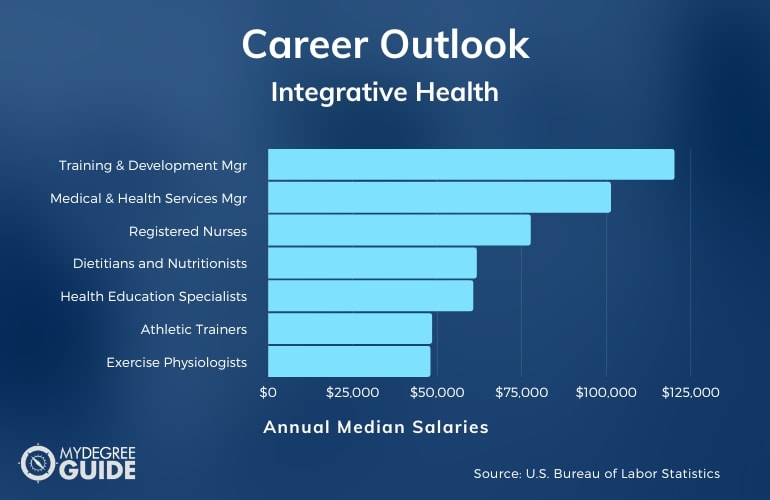A masters in integrative health teaches healthcare professionals how to use integrative and complementary health practices to guide and evaluate patients.

You can learn how to develop treatment plans based on a patient’s medical history and current lifestyle. Graduates can combine their knowledge of conventional medicine with their knowledge of lifestyle medicine, nutrition, and a variety of therapies.
Editorial Listing ShortCode:
This degree path is strategic for aspiring and current healthcare professionals who have an interest in alternative medicine.
Universities Offering Online Masters in Integrative Health Degree Programs
Methodology: The following school list is in alphabetical order. To be included, a college or university must be regionally accredited and offer degree programs online or in a hybrid format.
1. American College of Acupuncture & Oriental Medicine
The American College of Acupuncture & Oriental Medicine offers a Master of Integrative Healthcare Leadership that can be earned 100% online. The degree usually takes 3 to 4 semesters to complete. About a third of the coursework covers Chinese medical theory, another third covers general health and wellness, and another third covers healthcare management.
American College of Acupuncture & Oriental Medicine is accredited by the Southern Association of Colleges and Schools Commission on Colleges.
2. Bastyr University
Bastyr University offers a Master of Science in Nutrition for Wellness and Health Coaching. This hybrid program typically requires 1 year of online coursework followed by 1 year on campus in San Diego. It is designed for full-time students. The curriculum is designed to prepare students for CNS certification.
Bastyr University is accredited by the Northwest Commission on Colleges and Universities.
3. California Institute of Integral Studies
The California Institute of Integral Studies offers an MA in Integrative Health Studies. This 36-credit program is mostly online but does include residential intensives. It culminates with a capstone project. It can typically be finished in 2 years. Graduates are eligible to sit for the Health and Wellness Coaching Certifying Examination.
CIIS is accredited by the WASC Senior College and University Commission.
4. Creighton University
Creighton University offers an online program for an MS in Integrative Health and Wellness. The curriculum is designed to prepare students for the National Board for Health and Wellness Coaching Certification Exam. Potential courses include Health Behavior Modification, Nutrition for Chronic Disease, and Exercise for Chronic Disease. Applications are accepted on a rolling basis for five start dates every year.
Creighton University is accredited by the Higher Learning Commission of the North Central Association of Colleges and Schools.
5. Drexel University
Drexel University offers an MS in Integrative and Complementary Health. Courses are 10 weeks long and can be taken entirely online. Potential courses include Holistic Living for the Caregiver, Foundations of Complementary and Integrative Therapies, and Foundations of Phytotherapy.
Drexel University is accredited by the Middle States Commission on Higher Education.
6. George Washington University
George Washington University offers an MSHS in Integrative Medicine that can be earned 100% online. The degree requires the completion of 36 credits and takes an average of 30 months to complete. Each course is 8 weeks long. Students typically need to commit about 18 hours per week to their courses, including homework. The degree program offers an optional concentration in Nutrition.
GW is accredited by the Middle States Commission on Higher Education.
7. Georgian Court University
Georgian Court University offers an MA in Integrative Health that can be earned online, on campus, or in a combination of both. The program requires the completion of 36 credits and usually takes 1 to 2 years to complete. Students in the program receive real-world learning opportunities and take courses such as Research Methods, Anatomy and Physiology: A Holistic Approach, and Holistic Spirituality.
Georgian Court University is accredited by the Middle States Commission on Higher Education.
8. Grace College
Grace College offers a Master of Science in Integrative and Functional Medicine that can be earned online. Students may choose to earn a Bachelor of Science in either Exercise Science or Health Science along with their master’s degree in the program’s dual degree option. The curriculum includes many hands-on learning opportunities and incorporates a Biblical worldview.
Grace College & Seminary is accredited by the Higher Learning Commission.
9. Logan University
Logan University offers a Master of Science in Integrative Pediatrics program that is intended for chiropractic doctors and students. The program is mostly online, with in-person sessions held on campus once a year. It usually takes 2 years to complete and is only available part-time. The curriculum is evidence-based and clinical-focused.
Logan University is accredited by the Higher Learning Commission.
10. Maharishi International University
Maharishi International University offers an online program for an MS in Maharishi Ayurveda and Integrative Medicine. This part-time program can typically be finished in 3 years, with one campus visit each year for clinical training. Online classes include two 90-minute live webinars each week, as well as asynchronous components that can be completed on a student’s own time.
MIU is accredited by the Higher Learning Commission.
11. Maryland University of Integrative Health
The Maryland University of Integrative Health offers an online program for a Master of Arts in Integrative Health Studies. New students can start each fall. To graduate, students must complete 30 credits. The program can typically be completed in 5 trimesters by taking 6 credits at a time. There are currently no requirements to come to campus.
MUIH is accredited by the Middle States Commission on Higher Education.
12. Northwestern Health Sciences University
Northwestern Health Sciences University offers a Master of Science in Functional and Integrative Nutrition. The degree can be earned 100% online. The curriculum covers business in addition to nutrition and health. It is designed to be flexible to meet the needs of busy professionals.
Northwestern Health Sciences University is accredited by the Higher Learning Commission.
13. Ohio University
Ohio University offers a Master of Integrated Health Studies. This 33-credit program includes a set of core courses, and then students choose two concentrations. Possible options are Veterans’ Health, Health Policy, Global Health, Healthcare Leadership, and Clinical Informatics. The degree can be earned fully online.
Ohio University is accredited by the Higher Learning Commission.
14. Point Loma Nazarene University
Point Loma Nazarene University offers a Master of Kinesiology in Integrative Wellness that can be earned online, potentially in just 1 year. The program requires the completion of 30 units. Potential courses include Evidence-Based Practice and Research Methods, Lifestyle Medicine and Integrative Health, and Exercise and Nutrition for Health and Healing.
Point Loma Nazarene University is accredited by the WASC Senior College and University Commission.
15. Saybrook University
Saybrook University’s MS in Integrative and Functional Nutrition program does not require a thesis and can typically be completed in 2 to 3 years. The program requires the completion of 39 credits. Potential courses include Foundations of IFN, Research Literacy for Practitioners, and Systems Biology I. The degree can be earned 100% online.
Saybrook University is accredited by the Senior Commission of the Western Association of Schools and Colleges.
16. St. Catherine University
St. Catherine University offers an online program for a Master of Arts in Holistic Health Studies. The curriculum aims to teach students how to apply both Eastern and Western concepts for a balanced approach to health. The degree requires the completion of 39 credits, including a practicum. New students can start in the fall or spring, and the program can usually be completed in 2.5 years.
St. Catherine University is accredited by the Higher Learning Commission.
17. Thomas Jefferson University
Thomas Jefferson University offers an MS in Integrative Health Sciences that can be earned online. The program requires the completion of 30 credits. Potential courses include Foundations in Integrative Nutrition, Foundations in Mind-Body Medicine, and Integrative Health Education Practicum. Students can potentially complete the degree requirements in just 1 year of full-time study.
Thomas Jefferson University is accredited by the Middle States Association of Colleges and Schools.
18. University of Minnesota – Twin Cities
The University of Minnesota—Twin Cities offers a Master of Arts in Integrative Health and Wellbeing Coaching. The program is mostly online but does include two in-person weekend intensives on campus each semester. Students must complete 30 credits of coursework, including an internship and a practicum.
The University of Minnesota – Twin Cities is accredited by the Higher Learning Commission.
19. University of Utah
The University of Utah offers a Master of Science in Nutrition and Integrative Physiology. This online program requires the completion of 38 credits. New students can begin every fall, and students can usually finish the degree requirements in 2 years of full-time enrollment. Utah’s online classes are designed to be interactive while still providing flexibility for working professionals.
The University of Utah is accredited by the Northwest Commission on Colleges and Universities.
20. University of West Georgia
The University of West Georgia offers a Master of Science in Integrative Health and Wellness. The degree is available 100% online. To graduate, students must complete 30 credits. Potential courses include Lifestyle Medicine and Integrative Health, Mind Body Medicine, Advanced Health and Wellness Coaching, and Introduction to Research in the Human Sciences.
The University of West Georgia is accredited by the Southern Association of Colleges and Schools Commission on Colleges.
Masters in Integrative Health Online Programs

Integrative health is the intersection between conventional medical practices and complementary alternative therapies, forming a holistic and specific approach to treatment.
Integrative health graduate programs help prepare students to either enter the healthcare field or add integrative health to their current practice. Traditional approaches to healthcare may involve treating a patient’s medical conditions through medication or extensive procedures.
Integrated health science teaches students how herbal medicine, nutrition, acupuncture, yoga, and more can be effective and complementary forms of healthcare. Graduates from this program should be able to explain and evaluate the principles of integrative health care, implement nutrition fundamentals into treatment plans, and more.
Integrative health encompasses many career options within the healthcare field. Integrative health professionals may work in fields like:
- Consulting
- Education
- Administration
- Integrative healthcare practice
Some of these career paths may include:
- Nutritionist
- Corporate wellness consultant
- Health and wellness coach
- Program developer
Integrative health graduate programs will build upon your current knowledge of medicine and introduce you to non-traditional methods of patient care. Doing so necessitates that the curriculum is as holistic as the discipline itself. As such, you’ll likely study subjects like:
- Advanced nutrition
- Nutrition-based therapy
- Mind-body medicine
- Health education
- Behavior change theories and principles
If you’re currently practicing traditional medicine, the subjects you’ll study in this program are designed to make you a well-rounded healthcare professional. You can develop the skills to assess different aspects of a medical condition and provide treatment plans that are tailored to a patient.
This area of study is beneficial to current healthcare practitioners who want to understand integrative health or implement these methods into their practice. This degree path is also beneficial, though, for other health professionals, such as educators and administrators.
A masters in integrative health could also help you enter the field for the first time. Some integrative health masters programs offer electives and concentrations that allow you to focus on a specialty area within the field.
Integrative Health Careers & Salaries

A masters in integrated health science is beneficial for a range of professionals, especially for those with a bachelor’s degree in a related field. This type of program can help you develop your existing knowledge while introducing you to a variety of therapies that approach medical conditions from a holistic, lifestyle perspective.
According to the Bureau of Labor Statistics, here are some career paths that may be pursued by integrative health professionals, depending on their specialty.
| Careers | Annual Median Salaries |
| Training and Development Managers | $120,130 |
| Medical and Health Services Managers | $101,340 |
| Registered Nurses | $77,600 |
| Dietitians and Nutritionists | $61,650 |
| Health Education Specialists | $60,600 |
| Athletic Trainers | $48,420 |
| Exercise Physiologists | $47,940 |
| Recreational Therapists | $47,940 |
| Massage Therapists | $46,910 |
| Fitness Trainers and Instructors | $40,700 |
Many factors influence the hiring process, such as your prior education and experience. Healthcare practitioners, such as registered nurses and medical doctors, require specific education and licensure.
Some graduates are already clinicians who practice traditional medicine. For them, this degree can be complementary to their current practice.
Integrative Health Masters Curriculum & Courses

Holistic health degrees offer students the opportunity to take many courses, some of which may include:
- Nutrition I: Assessment, Diagnosis, Intervention: This course will familiarize you with the risks posed by macronutrients, micronutrients, and environmental factors.
- Nutrition II: Life Cycle: This course builds upon Nutrition I to teach you how nutritional requirements change over time.
- Foundations in Integrative Medicine: You’ll learn about the sociocultural and historical factors that have influenced the patient-centered approach to healthcare.
- Self-Care Methods for Health Care Professionals: You’ll be introduced to the mental and physical toll that the healthcare industry may have on a healthcare professional.
- Nutritional Metabolism and Environmental Exposure: In this course, you are taught how to study immune, nervous system, and gastrointestinal diseases while creating effective treatment plans.
- Mind Body Medicine: You’ll be introduced to the ways in which physical, emotional, and social factors affect mind, body, and behavior.
- Advanced Health and Wellness Coaching: You’ll learn how to practically apply your theoretical knowledge about health and wellness coaching.
- Introduction to Research in the Human Sciences: You’ll learn the quantitative and qualitative methods that are required to become a better researcher.
- Health Technologies: This course familiarizes you with the design, science, and application of health technologies so that you can use them as an effective form of treatment.
- Lifestyle Medicine and Integrative Health: This course will cover the forms of lifestyle medicine and how they can be used as treatments to create a healthier lifestyle.
Courses vary by school and program, so it’s helpful to do your research before making your decision to ensure that a program’s available courses fit your goals.
Admissions Requirements

The admissions requirements will vary depending on the program you choose, but below is a list of some requirements you can generally expect to see:
- Bachelors degree from an accredited school
- Resume
- Two letters of recommendation
- Minimum 3.0 GPA requirement, on average
- GRE or GMAT scores (only some schools require them)
It’s strategic to research your specific program to ensure that you have the necessary qualifications to meet the specified requirements.
Master’s in Integrative Health Programs Accreditation

Many colleges and universities seek accreditation status, which testifies to the standard of education that they provide. Regional accreditation certifies that a school has passed a series of evaluations and can be trusted to provide students with a high-quality education.
Attending an accredited university could help you make yourself more marketable to employers. Many healthcare employers also require candidates to hold accredited degrees. Higher education institutions also have to be accredited in order to receive federal financial aid.
Financial Aid and Scholarships

Many students seek financial aid opportunities in order to meet the cost of their graduate studies. Fortunately, there are many options for students who qualify.
You may want to start by filling out the Free Application for Federal Student Aid (FAFSA). Federal aid is commonly administered through student loans that are paid back post-graduation. Additional forms of financial aid include scholarships and grants. These are typically offered on both a local and federal level, giving students extra opportunity to receive aid.
A number of employers also offer tuition benefits to workers who desire to further their professional qualifications.
What Can You Do with a Masters in Integrative Medicine Degree?

A master’s in integrative medicine can help you understand and implement complementary alternative medicine within the healthcare field. The holistic nature of your major will introduce you to different methods of healthcare.
Some students are already health practitioners who want to implement alternative health methods into their current practice. Others are health educators or administrators who can benefit from understanding more about this field.
Some graduates pursue positions as athletic trainers, fitness instructors, massage therapists, or yoga instructors. Those who specialize in nutrition may pursue certification as a nutritionist.
How Long Does It Take to Get an Online Masters in Integrative Health and Wellness?

Most masters programs can be completed in 1 to 2 years with full-time study. Masters in integrative health graduate programs are generally comprised of around 36 credit hours. How long it takes you to finish could depend on your schedule as well as the program’s format.
Some health services degree online programs offer shorter terms, which could enable you to finish closer to 1 year if you study full-time and year-round, including during the summer months. If your program has a thesis component, this could extend your time to completion.
What’s the Difference Between a Masters in Integrative Medicine vs. Functional Medicine?
Two of the primary degrees in alternative medicine are a masters in integrative medicine and a masters in functional medicine.
| Integrative Medicine | Functional Medicine |
|
|
These holistic health degrees bear some similarities, but it’s helpful to consider which path is best suited to you and your goals.
Is a Masters in Integrative Health Studies Worth It?

Yes, a masters in integrative health studies is worth it for many professionals. This type of program allows you to develop your expertise in alternative forms of medicine and patient care.
This degree path is also applicable to a wide variety of health careers, including those in education and development, clinical practice, administration, and consulting. According to the Bureau of Labor Statistics, employment in the healthcare field is expected to rise by 13% over the next ten years, which is faster than average.
Getting Your Masters Degree in Integrative Health Online

Masters degree in integrative medicine programs online can help you learn valuable skills that are applicable to various sectors of healthcare.
Whether you’re a practicing clinician or entering the healthcare field for the first time, this degree can help you advance your understanding of alternative medicine and how it can complement traditional practices. This degree path can benefit a range of health professionals, including educators, consultants, practitioners, and administrators.
You might be interested in an integrative health masters degree program if you have a passion for healthcare and helping others. The sooner you start researching accredited universities, the sooner you can begin taking your education and career to the next level.
